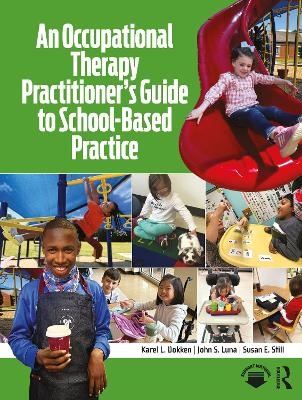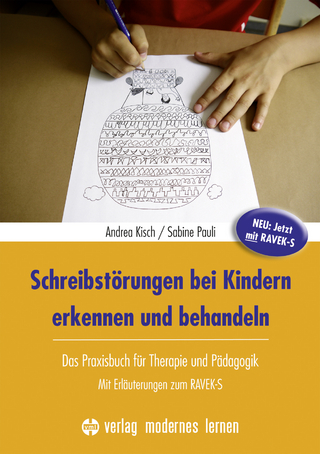
An Occupational Therapy Practitioner’s Guide to School-Based Practice
SLACK Incorporated (Verlag)
978-1-63091-732-6 (ISBN)
Beginning with an overview of the purpose of school-based interventions, the authors map out current populations, programs, and legal and licensing standards to give school-based practitioners the knowledge to practice safely and ethically. The book then explores how to successfully navigate the referral process from eligibility to intervention, incorporating helpful tips and references to help establish patterns of best practice. It also features numerous examples of current and reliable evaluations so that practitioners can expand their repertoire of assessments while ensuring a holistic avenue of care to reflect the distinct value of occupational therapy.
Written by authors with a wealth of experience in this field, the book will be essential reading for both new and more experienced occupational therapy practitioners, as well as students training towards working in a school-based context.
Karel L. Dokken, OTD, OTR/L graduated from the University of Minnesota in Minneapolis, Minnesota, in 1992 with a bachelor of science degree in occupational therapy, and from the Rocky Mountain University of Health Professions, Provo, Utah, in 2016 with a postprofessional clinical doctorate in occupational therapy. She has served as an adjunct faculty member in the Rocky Mountain University of Health Professions’ doctor of occupational therapy program and Kennesaw State University’s Department of Continuing Education in Kennesaw, Georgia. She completed the American Occupational Therapy Association fieldwork educators certificate program, enhancing her role as a Level II clinical instructor for fieldwork students in school-based practice. Through the years, she has consistently sought out innovative practice settings, paving the path for occupational therapists to expand their practice beyond traditional settings. John S. Luna, OTD, OTR graduated from the University of Texas-Pan American, Edinburg, Texas, in 2002 with a bachelor of science in occupational therapy. He has spent his career focused primarily on pediatric intervention with advanced training in neurodevelopmental treatment and sensory integration. During his career, he worked to improve service delivery in several key leadership positions, from 2004 to 2017, through clinical administration. He returned to school in 2015 and graduated from the Rocky Mountain University for Health Professions, Provo, Utah, in late 2016 with a postprofessional doctorate in occupational therapy. He has since taken on a full-time position at the University of Texas Rio Grande Valley, in Edinburg, Texas, working with future occupational therapists. Susan E. Still, OTD, OTR/L graduated from Boston University Sargent College of Allied Health, Boston, Massachusetts, in 1995 with a bachelor of science in occupational therapy and the Rocky Mountain University of Health Professions, Provo, Utah, in 2016 with a postprofessional clinical doctorate in occupational therapy. Her career has focused on pediatric intervention in a variety of settings including a children’s hospital in both inpatient and outpatient settings, private practice, home health, and public schools. While working as a contract therapist, she served as the lead therapist, supervising and mentoring fellow contract therapists in her school district. She developed a multidisciplinary feeding and swallowing program for a large metropolitan public school system. During her time at a large children’s hospital, she was an occupational therapy team leader at an outpatient satellite, served on a variety of committees to improve clinical competency including feeding and swallowing and assistive technology, and was the chairperson for the sensory processing competency committee.
1 School-Based Practice: An Introduction to the Educational Model 2 The Role of Occupational Therapy in School-Based Practice 3 Preserving Our Identity: Utilizing the American Occupational Therapy Association Framework to Integrate the Unique Contributions of Occupational Therapy in the Educational Model 4 Occupational Therapy Evaluations Across Populations: Preschool to High School 5 Improving Participation Through Intervention 6 Documenting Occupational Therapy Services in the School Setting 7 Classroom Seating Can Be as Easy as Anthropometrics, Biomechanics, and Creating Environmental Affordances . . . or ABC 8 Assistive Technology in School-Based Practice 9 The Importance of Addressing Feeding and Swallowing at School 10 Special Considerations for Health Management to Support Educational Participation 11 The Supervisory Role of the Occupational Therapy Practitioner in School-Based Practice 12 Maintaining Your Professional Integrity Appendix A Master Student List Appendix B Campus Calendar Appendix C Continuing Education Unit Course Tracker Appendix D Occupational Therapy Teacher Checklist of School Function Appendix E Scheduling Letter for Teachers Appendix F Teacher Goal Report Appendix G Treatment Planning Activity Worksheet Appendix H Yearly Evaluation Calendar
| Erscheinungsdatum | 21.08.2024 |
|---|---|
| Zusatzinfo | 29 Tables, black and white |
| Sprache | englisch |
| Maße | 216 x 280 mm |
| Gewicht | 440 g |
| Themenwelt | Sachbuch/Ratgeber ► Gesundheit / Leben / Psychologie |
| Medizin / Pharmazie ► Physiotherapie / Ergotherapie ► Ergotherapie | |
| ISBN-10 | 1-63091-732-X / 163091732X |
| ISBN-13 | 978-1-63091-732-6 / 9781630917326 |
| Zustand | Neuware |
| Haben Sie eine Frage zum Produkt? |
aus dem Bereich


